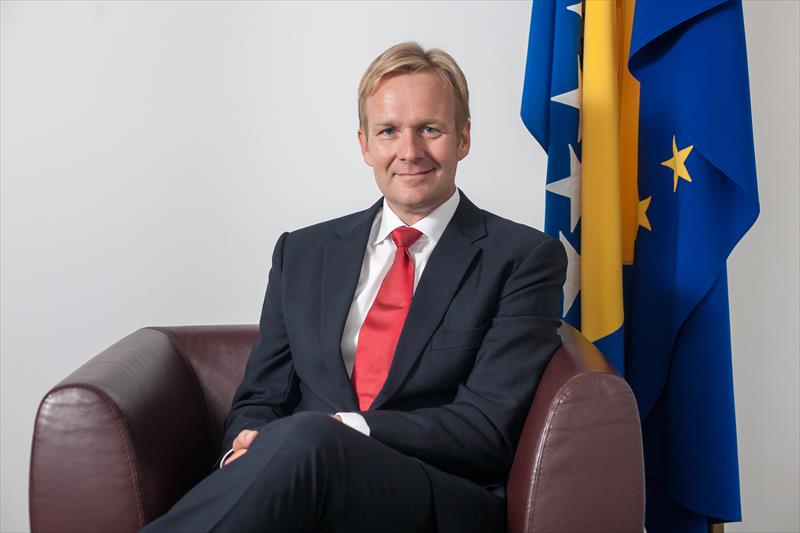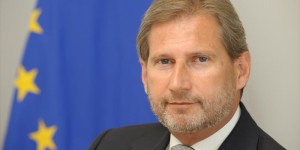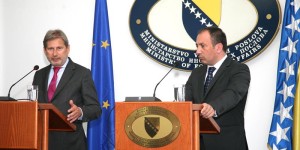How would you rate this year’s general elections in BiH? Were they really democratic since a lot of parties had complaints?
The EU has welcomed the overall orderly conduct of the elections and also made clear that allegations of irregularities should be investigated. I would like to commend the large number of observers from Bosnia and Herzegovina who took part, mainly through the ‘Pod lupom’ civil society coalition. We are grateful too for the work of the OSCE/ODIHR observation mission and their eventual recommendations of OSCE/ODIHR will need to be addressed by Bosnia and Herzegovina.
Can it happen again to BiH that the citizens wait a long time for the formation of the government at both state and entity levels?
I hope not. Swift government formation at all levels is of the utmost importance. Incoming authorities need to get on with addressing the real challenges that BiH faces as soon as possible. The economic and social issues in particular can’t wait. It is now up to those elected to deliver in the next four years.
What are the priority areas that should be targeted by the new governments on all levels?
There are of course some well-known issues on the table. Both BiH citizens and the EU want this country to join the EU. And every survey shows that citizens want a better life – they want jobs, better salaries and pensions, good education and health system, a strong fight against corruption.
So everyone working in politics and institutions has, I think, a responsibility to take forward social and economic reform that will open up more jobs, use public funds more wisely and make it easier to do business. That is the way to build more prosperity. Linked to that, clearly there needs to be progress on the key EU-related obligations. This includes ending discrimination in certain elections and making an agreement on a co-ordination mechanism so that BiH can speak to the EU with one voice. If those things can be done, I think Bosnia and Herzegovina can make progress first and foremost on its own prosperity and equally on its EU future.
How would you comment on BiH following your engagement as the EUSR?
Given the range and depth of the work the EU does here, what’s important is the overall EU-BiH relationship and the whole team – certainly not me alone.
It’s a deep relationship: the EU is the biggest source of financial assistance to this country and my office is implementing it. Since September 2011, I have signed 422 contracts for projects worth just under 300 million Euro in total; 202 contracts totalling nearly 231 million Euro are currently under implementation.
We have developed a very clear and very comprehensive communication between Bosnia and Herzegovina and Brussels, with a much clearer understanding here in the country of what the path to the EU really looks like. You know better what getting to the EU involves, and I think we are working with the situation and specificities of Bosnia and Herzegovina.
And more generally the EU has been present around the country through our meetings, our offices in the regions, our public events and outreach. All of which is to say that there is a real partnership evolving between BiH and the EU. There is a good development under way. That stronger partnership is a success.
What do you consider your greatest success and what do you consider your biggest failure when it comes to BiH?
There’s been a wide range of issues coming over the desk in the past three years. However, following the devastating floods that hit the country in May, our office has put a great deal of effort into dealing with the emergency and the aftermath.
The European Union of course responded immediately through the Civil Protection Mechanism. It was in fact the largest operation since the creation of the Mechanism with 3,000 people rescued and 23 EU Member States offering assistance including motor boats, firefighters, helicopters, pumps and a lot more. Approximately 800 relief workers were deployed to Bosnia and Herzegovina and Serbia during the emergency operations.
Now we are implementing the EU programme for flood recovery worth 42 million Euro and I am very pleased with how it is going – and how fast it is going. The programme will rehabilitate 4,000 dwellings – for approximately 14,000 people – 100 local roads and bridges, 90 educational institutions, 10 water and sanitation facilities, three municipality buildings; four Centres for social welfare, and four healthcare facilities. Also in the 24 most affected municipalities, grants will be made to small and medium enterprises to help them restart activity, retaining around 2,000 jobs.
These days I am attending opening of schools and kindergartens. It’s very rewarding and makes you feel as though you are really making a difference when you can present reconstructed and modern educational facilities for children in Bosnia and Herzegovina.
I would also point to the population and housing census. Lots of people told us it couldn’t be done. But together with the three statistical institutes it was done!
Obviously, we all hoped that Bosnia and Herzegovina would be further on in the EU integration process than it is. But it takes two to tango! I hope that the current stalemat can be addressed by Bosnia and Herzegovina swiftly.
In your opinion, would it be good for BiH if the coalitions at all levels of governments were formed by the same political parties, and would BiH move more quickly towards the EU if that was the case?
Of course, we are aware of media statements coming from various political parties on forming governments at all levels, but we are not in business of forming political coalitions in Bosnia and Herzegovina. Citizens have voted for their political representatives and political parties will discuss future coalitions. Bosnia and Herzegovina should get new authorities as soon as possible because a lot of important work awaits them.
Was the international community engaged too much in the election process in BiH because such comments could be heard as well?
I can only speak for the EU, and I think the EU engaged appropriately. On 12 October, we had a large group of election observers all over Bosnia and Herzegovina, I went out myself, and this contributes to the transparency of the process.
What is awaiting your successor here and in your opinion what should be his priorities?
Once you leave, you leave – and I would not presume to set an agenda for my successor. In fact, I think the real work is for the authorities in Bosnia and Herzegovina to do: to fulfil the expectations of citizens especially after the elections.
I would like to underline that there is a deeply serious economic situation here. This is a top priority issue. Some clear decisions will need to be taken. In July, experts, international organisations and citizens spelt out concretely in the Compact for Jobs and Growth what they think should be done to get the economy moving: reduce taxation on work to make it less of a burden to employ new workers; increase openness and competition in the labour market to make it easier for young people and unemployed people to find work – and to ensure hard work pays off; slash the requirements for and time taken to start a business; pass an improved insolvency framework so businesses can be restructured faster; produce clear, public e-registers of procedures for licences and permits; reduce the amount of privileged pensions, and raise social assistance for those who really need it.
Foreign Minister Zlatko Lagumdzija asked you to “show” the payment slip with the donors’ money for the flooded areas, arguing that none has been sent, and he also asked which governments apparently spent the donors’ money for filling the budget holes because such claims were coming from the international community, even from the EU?
The EU has made no such statement. We can only speak and have only spoken about our own funds – our first 42 million euro of recovery funding is being implemented right now by UNDP, UNICE and IOM. I understand that pledges by the IMF and World Bank have been transferred to BiH. Other bilateral donors stand ready to transfer funds once BiH authorities have defined relevant allocation criteria. Notwithstanding the European Commission’s organisation, together with France and Slovenia, of the Donors’ Conference, ownership of donor funds co-ordination lies clearly with BiH authorities and we are pleased that BiH held a donor co-ordination meeting on 16the October.
Recently, the European Commission published annual Progress Report, for which many say is the worst so far. Some BiH officials said that the EU has great expectations from BiH and that Brussels should take some responsibility for the stalemate. In the opinion of BiH officals, it is evident in the report that responsibility for most of the problems lies with the Federation of BiH. How do you comment on this?
The 2014 Progress Report for Bosnia and Herzegovina is very clear – the country as a whole has made very limited progress in addressing the political criteria and has not overcome the standstill in the European integration process while most other countries in the region are moving ahead decisively.
This regrettable situation is caused mostly by a lack of collective political will on the side of the leadership as a whole. The efficiency and functioning of the political institutions at all levels of government need to be improved and a well-functioning coordination mechanism on EU matters be set up urgently with the determined participation of everyone.
The European Union is here and is ready to lend its support and assistance. But we need to see real determination from Bosnia and Herzegovina collectively to now overcome the obstacles.




